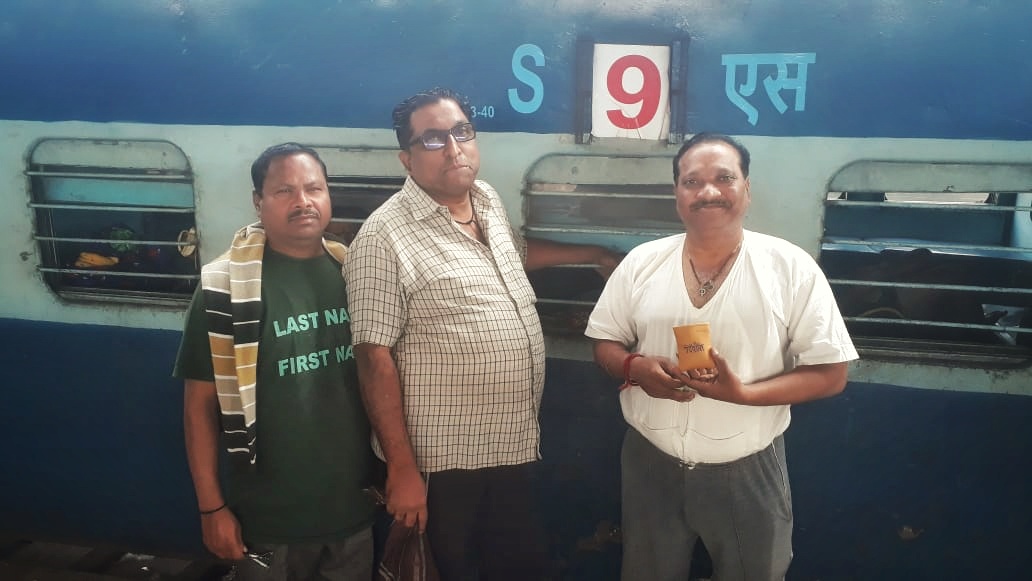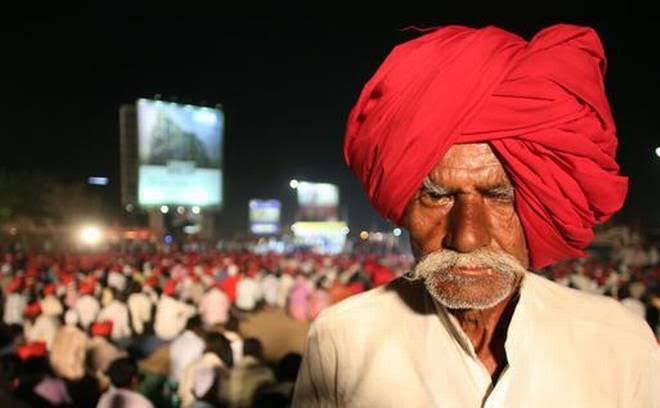India
Nation for farmers
A train journey reflects on how India sees its farmers

If India be a giant cake, it can be easily said that a long distance train journey through it is a slice that cuts right across the innumerable diversities that this country has to offer. During the travel in train towards Delhi for covering the Kisan Mukti March happening on November 29 and 30, Indie Journal tried to speak with diverse people in the train about agrarian conditions in their region and about the upcoming protest in Delhi.
Almost everyone we spoke with was related to farming in one way or the other. Through these conversations, we also got a glimpse of how crops change with the geography and economy and how the quantum of challenges faced by farmers varies with other conditions. Following are some excerpts from the conversations.
"Even if I travel to my home place for a few days, I avoid going towards our farm", said Sameer aged around 30 who originally hails from Ratanpura in Dholpur district of Rajasthan. He has shifted to Pune since ten years now and has a small businesses of marble fitting there. His family has a small holding of land in Ratanpur but his brother and father look after the farm. As the number of people dependent on the already scant land increased, Sameer decided to leave his village in search of job.
"After I began to get work in Pune, I used to invest the profit I earned from my small businesses into our farm but it was of government use as the money never comes back from the farm" he said. He had to face consecutive losses due to price crash and bad harvests of mustard and wheat. Now he has stopped investing his money in the farm and the output has further deteriorated as a result.
Sameer was not aware about the march happening in Delhi but when asked about the demand for a special session of parliament being raised by Kisan Mukti March, he said "It should absolutely happen, the government owes a lot to farmers".
Rajender Singh from Mathura had a different story to tell. The area he hails from comes in Uttar Pradesh and has borders of two other states nearby- Haryana and Madhya Pradesh. The region is known for intensive farming and the farmers there grow three crops in a year, Paddy, Wheat and Moong in succession. He is a "mid level farmer" in his own words in his area and his family owns around 28 acres of land.
His entire crop of paddy this year was destroyed due to an insect which they call 'Gidar' in their local language. This insect has vanished nearly half of the total paddy crop in his tehsil. "We take advances from the buyers of paddy at the time of sowing, now when the crop has failed, I will have to pay the buyer from next year's crop which is quite burdensome", he said.
Talking about common problems faced by the farmers in his region, Rajender Singh said, "We never get the Minimum Support Price fixed for Wheat in Uttar Pradesh and have to travel to nearby Haryana for getting better prices," adding, "The costs we have to bear growing the crop has been increased by multiple times but the prices of our harvests are same."
"UP mein to kuchh bike na" (Nothing gets good price in UP) said Rajender Singh's 75 years old mother Kisandei who is travelling with him from Pune towards Mathura. Kisandei is originally from Haryana and was married to a farmer in Uttar Pradesh.

Kisandei. Photo: Rushikesh Gawade
When asked about what has changed about farming since her time, she said "Dava khaad jyaada lagne lagi hai, pehle to lagti na itni" (use of fertilizers and chemicals has been increased a lot) "Aur pehle hum ganna bote the ab chawal bone lage hai" (We used to sow sugarcane earlier but has been shifted to paddy) added the old lady referring to the change happened in the last thirty years. They had to shift from sugarcane to paddy because the sugar mill nearby them got dysfunctional a decade ago.
Rajender Singh was aware about the Kisan Mukti March and told that he had also participated in a local march earlier. "MPs are meant to be for us so it should happen" replied Kisandei on asking whether the special session of parliament as demand by farmers should happen or not.
Bajarang Ghodke, a army man from Ahmednagar district of Maharashtra was travelling back towards His post after a month long vacation from His village. "My family had sown three acre cotton this year, all of which has been dried up due to lack of rainfall" he said. "The entire rainy season this year was almost dry for us. We had spent around 30000 RS for seeds and some other expenses, all of which is gone now" he added.
 Bajrang Ghodke. Photo: Rushikesh Gawade
Bajrang Ghodke. Photo: Rushikesh Gawade
Bajarang's village Ranani in Ahmednagar has found an unique way to overcome poor state of farming in his region. "We always have been a low rainfall area so we have learnt that we cannot depend on agriculture as a primary income source. So people in my village try the hardest to get into government jobs. Almost every boy in my village has only one target in his youth- to join the armed forces. The boys look after the cattle in the morning to supplement their family income and the whole day train for physical examination required for entering army and police forces," said Bajarang. Every family in his village has one or two servicemen today. "But now the extreme competition has made it difficult for boys to enter government services" he added.
Bajarang also was aware of the march on 29th and 30th. "There should be no problem in holding special session of parliament for farmers" he opined.





